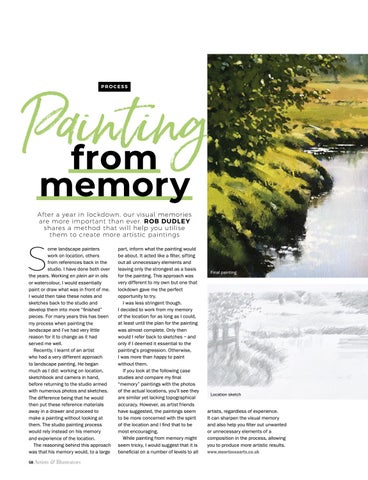Painting from PROCESS
memory
After a year in lockdown, our visual memories are more important than ever. ROB DUDLEY shares a method that will help you utilise them to create more artistic paintings
S
ome landscape painters work on location, others from references back in the studio. I have done both over the years. Working en plein air in oils or watercolour, I would essentially paint or draw what was in front of me. I would then take these notes and sketches back to the studio and develop them into more “finished” pieces. For many years this has been my process when painting the landscape and I’ve had very little reason for it to change as it had served me well. Recently, I learnt of an artist who had a very different approach to landscape painting. He began much as I did: working on location, sketchbook and camera in hand, before returning to the studio armed with numerous photos and sketches. The difference being that he would then put these reference materials away in a drawer and proceed to make a painting without looking at them. The studio painting process would rely instead on his memory and experience of the location. The reasoning behind this approach was that his memory would, to a large
58 Artists
& Illustrators
part, inform what the painting would be about. It acted like a filter, sifting out all unnecessary elements and leaving only the strongest as a basis for the painting. This approach was very different to my own but one that lockdown gave me the perfect opportunity to try. I was less stringent though. I decided to work from my memory of the location for as long as I could, at least until the plan for the painting was almost complete. Only then would I refer back to sketches – and only if I deemed it essential to the painting’s progression. Otherwise, I was more than happy to paint without them. If you look at the following case studies and compare my final “memory” paintings with the photos of the actual locations, you’ll see they are similar yet lacking topographical accuracy. However, as artist friends have suggested, the paintings seem to be more concerned with the spirit of the location and I find that to be most encouraging. While painting from memory might seem tricky, I would suggest that it is beneficial on a number of levels to all
Final painting
Location sketch
artists, regardless of experience. It can sharpen the visual memory and also help you filter out unwanted or unnecessary elements of a composition in the process, allowing you to produce more artistic results. www.moortoseaarts.co.uk
















